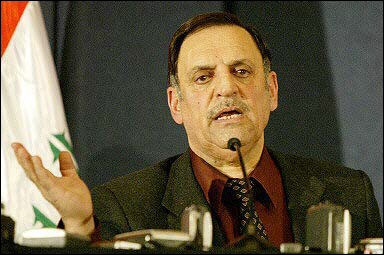|
Iraqi religious Shiite parties dominant in elections
(AFP)
Updated: 2006-01-21 08:46
Iraqi Shiite-based religious parties won last month's general elections, but
failed to obtain an absolute majority of seats in parliament, according to
uncertified results released.

Iraqi religious
Shiite parties dominant in elections. [AFP] |
The conservative Shiite United Iraqi Alliance took 128 of parliament's 275
seats and their allies in the previous government, the Kurdish Alliance took 53
seats, leaving them only three seats short of the two thirds majority needed to
elect a president and rule alone.
The two lists were expected to invite in at least one of the Sunni Arab
parties in order to form a government of national unity representing as many of
the nation's factions as possible.
The Sunni-based National Concord Front coalition took 44 seats, while Saleh
al-Mutlak's National Dialogue Front, another major Sunni party, took 11 seats.
Former prime minister Iyad Allawi's cross-sectarian Iraqi National List saw
his share of seats shrink from 40 to 25.
Of the total seats, 230 were alloted to candidates from the country's 18
provinces, while an additional 45 were distributed on a proportional
basis.
The government formed by these elections will govern the country
for the next four years, bringing a close to the period of transitional
governing bodies that have run the country since the fall of Saddam Hussein's
government in April 2003.
A period of intense haggling is expected to follow as the make-up of the
government is negotiated -- a process that took almost three months last year.
US officials have indicated that they hope to see the new government formed
sooner rather than later to avoid squandering the momentum of the elections.
The December 15 parliamentary elections saw some 70 percent of eligible
voters turn out, including a large proportion of the once-dominant Sunni Arab
minority that had largely boycotted previous contests.
Successful elections and a popular representative government are widely
believed to be key to defusing the insurgency currently raging in the country
and allowing reconstruction of the shattered economy and national
infrastructure.
The ability of the elections to heal Iraq was thrown in doubt, however, by
widespread calls of fraud and vote-rigging by the Sunni parties and Allawi's
party.
A month of investigations by the electoral commission only resulted in the
invalidation of less than one percent of the ballots on account of fraud --
findings that were backed on Thursday by an international commission of
monitors.
Despite their complaints over the process, no Sunni party has indicated that
it would boycott negotiations on setting up a new government.
|